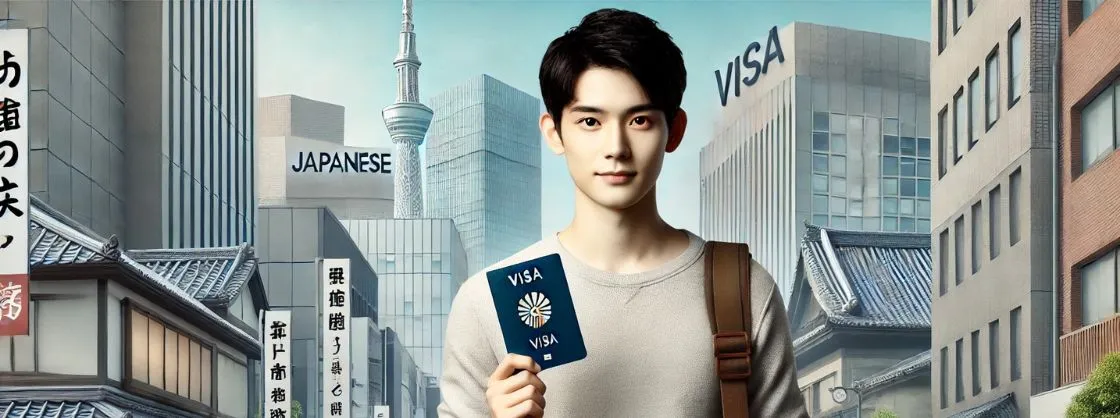Student Visa in Japan: Requirements, Process, and Tips for 2025
Table of Contents
Thinking about pursuing your academic dreams in Japan? Whether you’re captivated by the country’s blend of tradition and innovation or drawn by its world-class education system, securing a student visa in Japan is your first step toward this transformative experience. From understanding who needs a Japan study visa to learning about the application process, eligibility requirements, and even part-time work opportunities, this guide will walk you through every detail.
If you’re planning to study for over three months, you’ll need a Japanese visa student to unlock the doors to this enriching experience. We’ll cover everything from the types of visas available—be it for language schools, undergraduate degrees, or postgraduate programs—to practical tips for avoiding common application mistakes. By the end of this blog, you’ll feel confident and prepared to navigate the visa process with ease, so you can focus on what truly matters: embracing your academic journey in Japan.
Who Needs a Student Visa to Study in Japan?
If you’re an international student planning to pursue full-time studies at a Japanese institution for over three months, you’ll need a Japan study visa. Here’s a closer look at who qualifies:
- Eligibility Criteria:
- Enrolled in a recognized Japanese institution such as universities, vocational schools, or language schools.
- Proof of full-time enrollment in a course of at least 20 hours per week.
- Sufficient financial means to cover tuition and living expenses during your stay.
- Meet the institution’s academic and language requirements (varies by program).
- Who Doesn’t Need a Student Visa?
Students attending short-term programs (less than 90 days) may use a tourist visa, depending on their nationality.
Types of Student Visas in Japan
Japan offers various student visas tailored to different study programs and durations. Choosing the right one ensures compliance with immigration regulations. Here’s a breakdown of the most common types of student visas in Japan:
| Visa Type | Purpose | Duration | Examples of Programs |
| Language School Visa | For learning Japanese at a recognized language institution. | 6 months – 2 years | Intensive Japanese language programs. |
| Undergraduate Visa | For pursuing a bachelor’s degree. | 4 years | Bachelor’s programs at Japanese universities. |
| Postgraduate Visa | For pursuing master’s or doctoral programs. | 1 year (renewable) | Master’s in engineering, PhD in Literature, etc. |
| Vocational School Visa | For enrolling in technical or vocational training programs. | 1–2 years | IT courses, fashion design, culinary arts, etc. |
| Short-Term Visa | For attending short-term or exchange programs. | Up to 90 days (non-renewable) | Semester exchange or cultural immersion programs. |
Requirements for a Japan Student Visa 2025
Meeting the Japan student visa requirements is the first step in securing your place at a Japanese institution. Here’s what you’ll need:
Core Document Requirements for Japan Student Visa 2025
- Certificate of Eligibility (CoE):
- Issued by your host institution as proof of admission.
- Includes details about your course, duration, and financial status.
- Financial Proof:
- Bank statements or scholarship letters showing sufficient funds (approx. JPY 1.5 million annually for living expenses).
- Sponsor letter if someone else is funding you.
- Educational Documents:
- Academic transcripts and graduation certificates.
- Identification Documents:
- Valid passport (minimum 6 months validity).
- Passport-sized photographs (as per Japanese visa guidelines).
- Language Proficiency Scores:
- Japanese Language Proficiency Test (JLPT) scores for Japanese-taught courses.
- TOEFL/IELTS for English-taught programs.
Table: Comprehensive Requirements for Japan Study Visa 2025
| Requirement | Details |
| Certificate of Eligibility (CoE) | Issued by the institution; confirms admission and purpose of stay. |
| Financial Proof | Minimum JPY 1.5 million (or equivalent) in savings or scholarship proof. |
| Passport | Valid for at least 6 months beyond your planned stay. |
| Photos | Recent passport-sized photos (as per Japanese guidelines). |
| Academic Records | High school diploma, undergraduate degree (as applicable). |
| Language Proficiency | JLPT, TOEFL, IELTS (depending on course language). |
| Application Fee | JPY 3,000–6,000 (depending on visa type). |
How to Apply for a Japan Student Visa 2025?
The application process for a Japanese visa student involves several steps. Staying organized is key to avoiding delays. Here’s the roadmap:
Step 1: Secure Admission
- Apply and gain acceptance to a recognized Japanese institution.
- Obtain the Certificate of Eligibility (CoE), which the institution applies for on your behalf.
Step 2: Gather Necessary Documents
- Collect all required documents, including financial proof, academic records, and passport.
Step 3: Submit Your Visa Application
- Apply at your nearest Japanese embassy or consulate.
- Attach your CoE and other documents with the application form.
- Pay the Japan student visa fee (approximately JPY 3,000 for single entry).
Step 4: Attend an Interview (if required)
- Some embassies may require an in-person interview to assess your intent and readiness.
Step 5: Wait for Visa Approval
- Processing times vary but typically take 5–10 business days.
- Once approved, you’ll receive a visa sticker in your passport.
Table: Step-by-Step Process for Japan Student Visa Application 2025
| Step | Details |
| Secure Admission | Enroll in a recognized institution and receive your CoE. |
| Gather Documents | Include financial proof, passport, academic records, and language scores. |
| Submit Application | Apply at the Japanese embassy or consulate; pay visa fees. |
| Attend Interview | Some applications require interviews to verify intent. |
| Visa Approval | Processing takes 5–10 days; visa granted upon approval. |
Common Mistakes to Avoid During Application
Applying for a Japan study visa is a meticulous process, and even small errors can lead to delays or rejection. Here’s how to avoid common mistakes and submit a flawless application:
1. Incomplete Documentation
- Mistake: Missing or incomplete documents like academic transcripts, financial proof, or language proficiency scores.
- Solution: Double-check the Japan visa requirements for students and prepare a checklist to ensure everything is included.
2. Financial Inconsistencies
- Mistake: Inadequate funds or discrepancies in bank statements can raise red flags.
- Solution: Ensure your financial proof covers at least JPY 1.5 million annually for living expenses.
3. Ignoring Deadlines
- Mistake: Late submission of your application or required documents.
- Solution: Apply at least 3–4 months before your intended start date.
4. Errors in the Application Form
- Mistake: Typos or inconsistent information in the visa application form.
- Solution: Review your application thoroughly before submission.
5. Lack of Proper Research
- Mistake: Applying for the wrong visa type or failing to understand the requirements of your program.
- Solution: Research the specific visa type (e.g., undergraduate, postgraduate) and tailor your application accordingly.
Tips to Ensure a Successful Visa Application Process
Below are some of the key steps to ensure a successful visa application process:
| Key Tips | Details |
| Start Early | Begin your application process as soon as you receive your Certificate of Eligibility (CoE). |
| Organize Your Documents | Use labeled folders or digital tools to keep track of required documents. |
| Seek Guidance | Consult with your university’s international office or Japanese embassy. |
| Provide Accurate Information | Ensure consistency across all forms and documents. |
| Practice for Interviews | Be ready to explain your academic goals and why you want to study in Japan. |
Can You Work on a Student Visa in Japan?
One of the perks of a Japanese visa student is the opportunity to work part-time during your studies. However, there are rules and restrictions to keep in mind.
Rules for Part-Time Work in Japan
Work Permit: International students need to obtain a “Permission to Engage in Activity Other than That Permitted under the Status of Residence” (shikakugai katsudo kyoka) from the Immigration Bureau.
Hours Allowed:
- Up to 28 hours per week during regular school terms.
- Up to 40 hours per week during vacations.
Job Types: Students can work in sectors like retail, hospitality, and tutoring but are prohibited from working in adult entertainment industries.
Benefits of Part-Time Work in Japan 2025
- Financial Independence: Earn extra income to cover living expenses.
- Cultural Immersion: Gain real-world experience and interact with locals.
- Skill Development: Build soft skills like communication and time management.
How to Renew or Extend a Japan Student Visa?
If your program lasts longer than your initial visa period or if you plan to pursue further studies, you’ll need to extend your Japan student visa. Here’s how:
Step 1: Start Early
- Begin the renewal process at least three months before your visa expires.
Step 2: Prepare Required Documents
Key Documents for Renewal:
- Application form for visa extension (available on the Immigration Bureau website).
- Valid passport and residence card.
- Certificate of Enrollment from your institution.
- Academic performance report or attendance record.
- Updated financial proof (bank statements or scholarship letters).
Step 3: Submit Application
- Apply at the nearest Immigration Bureau.
- Pay the Japan student visa fee for renewal, typically JPY 4,000.
Step 4: Await Approval
- Processing usually takes 2–3 weeks. Once approved, your residence card will be updated with the new expiration date.
Conclusion
Your study in Japan journey is more than just an academic pursuit; it’s an opportunity to immerse yourself in a vibrant culture, build a global network, and prepare for a bright future. By carefully understanding the Japan student visa requirements, avoiding common pitfalls, and exploring part-time work opportunities, you’ll set yourself up for success.
Japan’s welcoming environment, top-tier education, and exciting career prospects make it a destination worth the effort. With the right preparation, navigating the Japan visa requirements for students becomes a manageable step rather than a daunting challenge. So, take the leap, apply for your visa, and get ready to experience all that Japan has to offer. Your next big adventure awaits!
Frequently Asked Questions
How much does a student visa in Japan cost?
The Japan student visa cost is approximately JPY 3,000 for a single entry and JPY 6,000 for multiple entries.
Can I switch my visa type while in Japan?
Yes, you can switch from a student visa to a work visa upon graduation, provided you meet the eligibility criteria.
Can I work on a student visa in Japan?
Yes, you can work up to 28 hours per week with a part-time work permit.
How much CGPA is required for a Japanese visa student?
A minimum GPA of 2.3/3.0 or equivalent is commonly required for government scholarships like MEXT.
How long is the visa valid?
It depends on your program length, ranging from 6 months to 4 years, with extensions available.



